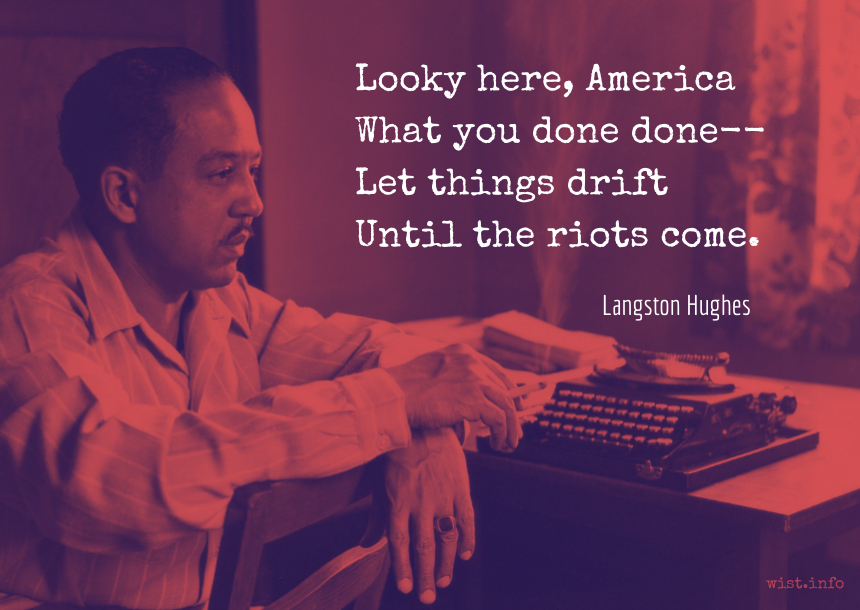This man through all his new life, fresh and young,
in virtual power was one who might have proved,
in all of his behaviour, wonderful.
Yet there, on earth, the richer soil may be,
the more — untilled or sown with evil seed —
its vigour turns to wilderness and bane.[Questi fu tal ne la sua vita nova
virtüalmente, ch’ogne abito destro
fatto averebbe in lui mirabil prova.
Ma tanto più maligno e più silvestro
si fa ’l terren col mal seme e non cólto,
quant’elli ha più di buon vigor terrestro.]Dante Alighieri (1265-1321) Italian poet
The Divine Comedy [Divina Commedia], Book 2 “Purgatorio,” Canto 30, l. 115ff (3.115-120) [Beatrice] (1314) [tr. Kirkpatrick (2007)]
(Source)
Beatrice, speaking of Dante.
(Source (Italian)). Alternate translations:
Such genuine worth adorn'd his early days,
That each prolific stem of heav'nly Grace
In that rich Mould a genuine footing found:
But, oh! the rankest soil but serves to feed
The plant of juice malign, and noxious weed.
If Culture's hand neglect the hapless ground.
[tr. Boyd (1802), st. 26]
This man
Was in the freshness of his being, such,
So gifted virtually, that in him
All better habits wond’rously had thriv’d.
The more of kindly strength is in the soil,
So much doth evil seed and lack of culture
Mar it the more, and make it run to wildness.
[tr. Cary (1814)]
This man was such, in his new being found,
Of virtuous kind, that every nobler way
In him gave proof of wonderful essay;
So much the more malignant, wild the soil
Of earth with evil seed, untilled with toil,
The more good vigour and terrestrial oil.
[tr. Bannerman (1850)]
Such had this man become in his new life
Potentially, that every righteous habit
Would have made admirable proof in him;
But so much more malignant and more savage
Becomes the land untilled and with bad seed,
The more good earthly vigour it possesses.
[tr. Longfellow (1867)]
This man was such in his new life, potentially, that every right habit would have wrought in him a wondrous result. But all the more malign and the more wild becomes the ground with bad seed and uncultivated, in proportion as it has from the soil more of good force.
[tr. Butler (1885)]
This one was such in new life's opening hour
Fitted for good, that every virtuous growth
Had made in him miraculous proof of power.
But so much more malign and tangled groweth,
With poisonous wilding seeds, the uncultured sward,
As of terrestrial strength the more it show.
[tr. Minchin (1885)]
This man was such in his new life, virtually, that every right habit would have made admirable proof in him. But so much the more malign and more savage becomes the land ill-sown and untilled, as it has more of good terrestrial vigor.
[tr. Norton (1892)]
This man was such in his new life potentially, that every good talent would have made wondrous increase in him.
But so much the more rank and wild the ground becomes with evil seed and untilled, the more it hath of good strength of soil.
[tr. Okey (1901)]
This man in his early life was such potentially that every right disposition would have come to marvelous proof in him; but so much the more noxious and wild the ground becomes, with bad seed and untilled, as it has more good strength of soil.
[tr. Sinclair (1939)]
This man was such in natural potency,
In his new life, that all the ingrained good
Looked in him to have fruited wonderously.
But so much groweth the more rank and rude
The soil with bad seed and unhusbanded,
The more it hath from earth of hardihood.
[tr. Binyon (1943)]
[...] had so endowed this man, potentially,
In his new life, that from such gifts as those
A wondrous harvest would have come to be.
But so much ranker, weedier, and more gross
Runs the untended field where wild tares seed,
As the good soil is rich and vigorous.
[tr. Sayers (1955)]
This man, potentially, was so endowed
from early youth that marvelous increase
should have come from every good he sowed.
But richest soil the soonest will grow wild
with bad seed and neglect.
[tr. Ciardi (1961)]
This man was such in his new life, virtually, that every right disposition would have made marvelous proof in him. But so much the more rank and wild becomes the land, ill-sown and untilled, as it has more of good strength of soil.
[tr. Singleton (1973)]
[...] was this man so endowed, potentially,
in early youth -- had he allowed his gifts
to bloom, he would have reaped abundantly.
But the more vigorous and rich the soil,
the wilder and weedier it grows
when left untilled, its bad seeds flourishing.
[tr. Musa (1981)]
This man, in his youthful years, had such
Possibilities, that every propitious tendency
Would have produced some marvelous result in him.
But ground sown with bad seed and not cultivated
Becomes the more malignant and overgrown
The more wholesome vigour there is in the soil.
[tr. Sisson (1981)]
He
when young, was such -- potentially -- that any
propensity innate in him would have
prodigiously succeeded, had he acted.
But where the soil has finer vigor, there
precisely -- when untilled or badly seeded --
will that terrain grow wilder and more noxious.
[tr. Mandelbaum (1982)]
This man, potentially, was such in his vita nuova, his new life, that every true skill would have grown miraculously in him. But the more good qualities the earth’s soil has, the more wild and coarse it becomes with evil seed, and lack of cultivation.
[tr. Kline (2002)]
He was such in his new life, potentially, that every good habit would have produced a marvelous result in him.
But all the more malignant and wild becomes the soil with bad seed and without cultivation, the more it has in it of good earthly vigor.
[tr. Durling (2003)]
This man in his new life potentially was such
that each good disposition in him
would have come to marvelous conclusion,
but the richer and more vigorous the soil,
when planted ill and left to go to seed,
the wilder and more noxious it becomes.
[tr. Hollander/Hollander (2007)]
And one such was this man's new life on earth,
So all good inclinations, all predictions,
Should wonderfully be proved in the life he lives.
Yet land improperly sown, and never tilled,
But blessed with soil of enormous power and strength,
Will turn itself more terribly rank and foul.
[tr. Raffel (2010)]
Quotations about:
neglect
Note not all quotations have been tagged, so Search may find additional quotes on this topic.
Too many cooks may spoil the broth, but it only takes one to burn it.
Julia Child (1912-2004) American chef and writer
(Attributed)
Referring to the Women's Suffrage Movement, as quoted by Madeleine Bingham, Something's Burning: The Bad Cook's Guide (1968) [unverified]. Sometimes said to be in the Introduction to her Julia Child's Kitchen, (1975), but not found there.
A certain combination of incompetence and indifference can cause almost as much suffering as the most acute malevolence.
Bruce Catton (1899-1978) American historian and journalist
A Stillness at Appomattox (1953)
(Source)
Regarding prison camps during the US Civil War.
LONDO: Big concerns grow from small concerns. You plant them, water them with tears, fertilize them with unconcern. If you ignore them, they grow.
There are few mortals so insensible that their affections cannot be gained by mildness; their confidence by sincerity; their hatred by scorn or neglect.
Johann Georg Zimmermann (1728-1795) Swiss philosophical writer, naturalist, physician
Aphorisms and Reflections on Men, Morals and Things (1800)
(Source)
We flatter those we scarcely know,
We please the fleeting guest;
And deal full many a thoughtless blow
To those who love us best.Ella Wheeler Wilcox (1850-1919) American author and poet.
“Life’s Scars” (1896)
(Source)
Originally published in Frank Leslie's Popular Monthly, Vol. 42, #4 (Oct 1896)
I never complained that my birthday was overlooked; people were even surprised, with a touch of admiration, by my discretion on this subject. But the reason for my disinterestedness was even more discrete: I longed to be forgotten in order to be able to complain to myself.
Looky here, America
What you done done —
Let things drift
Until the riots come.Langston Hughes (1902-1967) American poet, social activist, novelist, playwright
“Beaumont to Detroit: 1943”
(Source)
It is a mistake always to contemplate the good and ignore the evil, because by making people neglectful it lets in disaster. There is a dangerous optimism of ignorance and indifference.
To ignore evil is to become an accomplice to it.
Martin Luther King, Jr. (1929-1968) American clergyman, civil rights leader, social activist, preacher
Where Do We Go from Here: Chaos or Community? (1967)
(Source)
Yes, I see the church as the body of Christ. But, oh! How we have blemished and scarred that body through social neglect and through fear of being nonconformists.
Martin Luther King, Jr. (1929-1968) American clergyman, civil rights leader, social activist, preacher
Letter from Birmingham Jail (16 Apr 1963)
(Source)
Perpetual devotion to what a man calls his business, is only to be sustained by perpetual neglect of many other things.
Robert Louis Stevenson (1850-1894) Scottish essayist, novelist, poet
“An Apology for Idlers” (1881)
(Source)
And I have again observed, my dear friend, in this trifling affair, that misunderstandings and neglect occasion more mischief in the world than even malice and wickedness. At all events, the two latter are of less frequent occurrence.
[Und ich habe, mein Lieber, wieder bei diesem kleinen Geschäft gefunden, dass Missverständnisse und Trägheit vielleicht mehr Irrungen in der Welt machen als List und Bosheit. Wenigstens sind die beiden letzteren gewiss seltener.]
Johann Wolfgang von Goethe (1749-1832) German poet, statesman, scientist
Die Leiden des jungen Werthers [The Sorrows of Young Werther], “Letter from May 4th” (1774)
Alt. trans.: "Misunderstandings and neglect create more confusion in this world than trickery and malice. At any rate, the last two are certainly much less frequent."
DAUPHIN: Self-love, my liege, is not so vile a sin
As self-neglecting.William Shakespeare (1564-1616) English dramatist and poet
Henry V, Act 2, sc. 4, l. 80ff (2.4.80-81) (1599)
(Source)

















